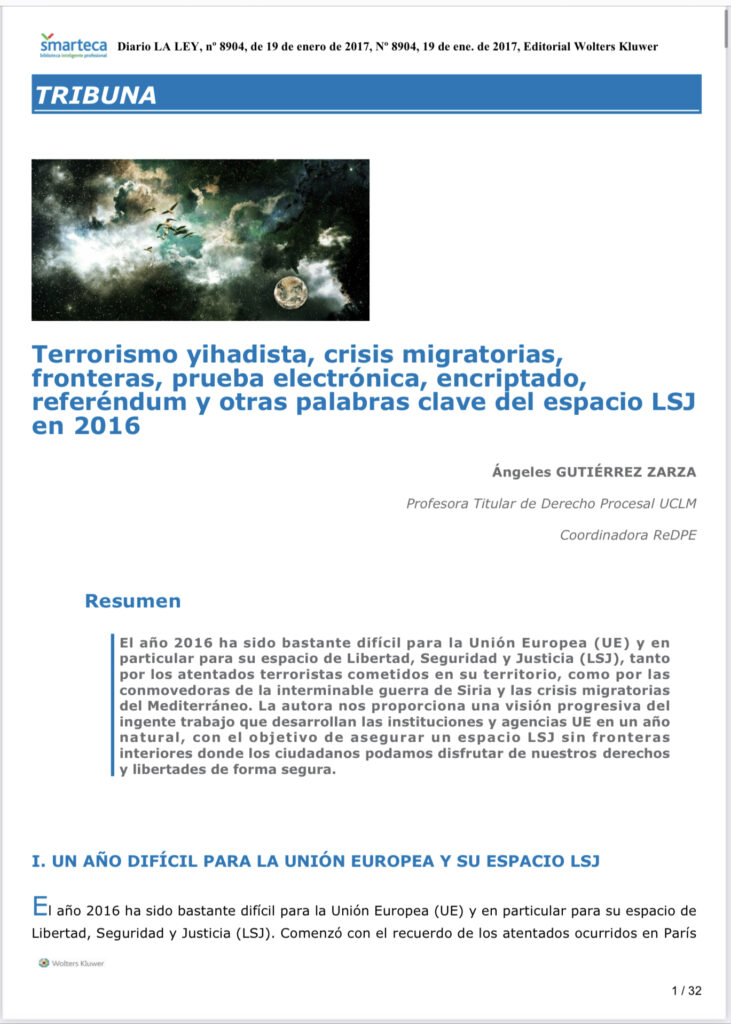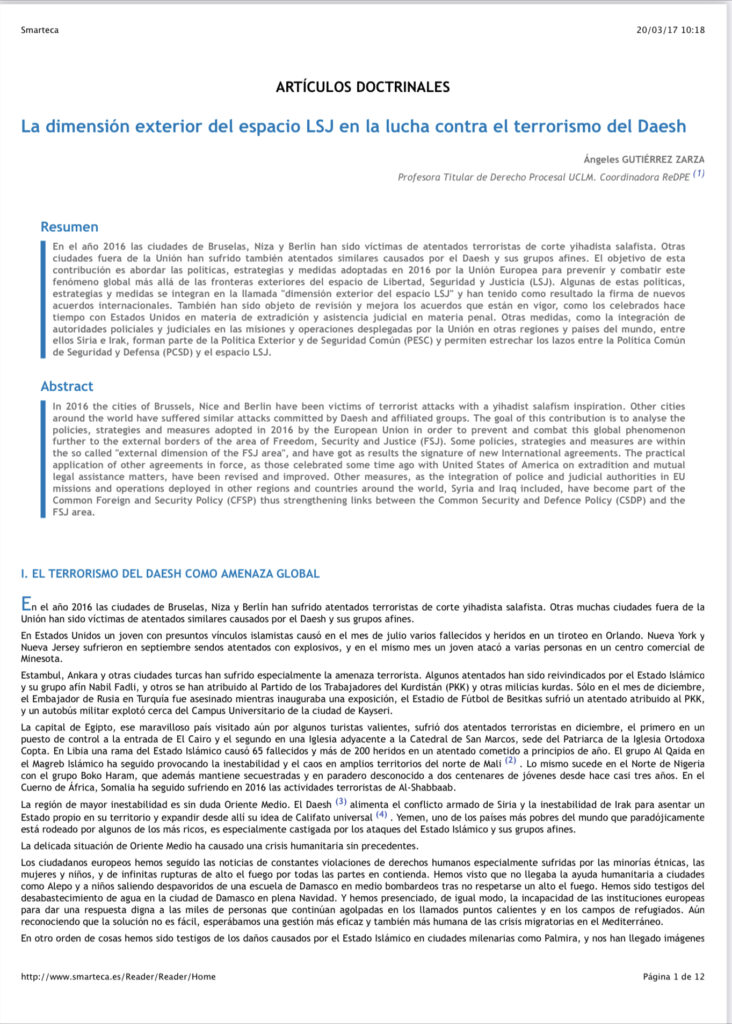On 25 August 2023, the «17th UN Report on the threat posed by ISIL (Da´esh) to international peace and security and the range of UN efforts in support of Member States in countering the threat» was presented at UN premises in New York – EN
According to the Report, in general terms the threat remains high in conflict zones and low in non-conflict areas, although the overall situation is quite dynamic and varies notably from one subregional to another (párr.(3)). In the particular region of Sahel, most relevant issues stressed by the report are as follows:
- The Regional affiliates operating in East Africa, namely the Islamic State in the Greater Sahara (ISGS) and the Islamic State West Africa Province ( ISWAP)) have gained autonomy as result of a less hierarchical command and control structure by Da´esh core (parr. 10 re parr. 24)
- Sudan is frequently used by fighters of Libya, Mali and West Africa as a hub for arrival from Middle East and onward transfer and expanded in the region (parr. 23).
- ISGS has increased the areas of operation and has the capacity to attack on several fronts in Mali and, to a lesser extent, Burkina Faso and the Niger. Its members, possibly in collaboration with ISWAP, are trying to establish a corridor to Nigeria for the purposes of logistical, supply and recruitment (parr. 25).
- ISGS is in contact with terrorist cells operating in North African countries, as some of those dismantled by Moroccan authorities the first semester 2023 (parr. 27).
- There is no collaboration of ISGS with the Al-Qaida affiliated Jama´a Nusrat ul-Islam wa al-Muslimin (JNIM), but continuous armed confrontations, which are impacting the security situation in the Sahel and «may lead to alliances of convenience forged by tribal or ethnic considerations and with unpredictable consequences» (parr. 26).
- ISGS is actively involved on illicit trafficking of weapons and arms captured locally after attacks against national security forces, as well as from facilitation networks operating in southern Libya (parr. 16).
- Among other sources of financing (see extensively parr. 12), ISWAP allegedly «extorted local agricultural business and fishing operations in the Lake Chad basin and kidnapped civilians for ransom in Nigeria, raising significant sums».
Jointly with UN Reports, at European level both Europol and Eurojust publishes regular reports on terrorism with law enforcement and judicial approaches. Such reports are mainly focused on the EU situation, however, the obvious links of most terrorist groups and cells operating in Europe with third States motivates that those reports cover also the external dimension of terrorism.
The last EU Terrorism Situation & Trend Report (TESAT) is available below. It is drafted by Europol experts officials on terrorism on the basis of information provided by EU Member States and Eurojust.
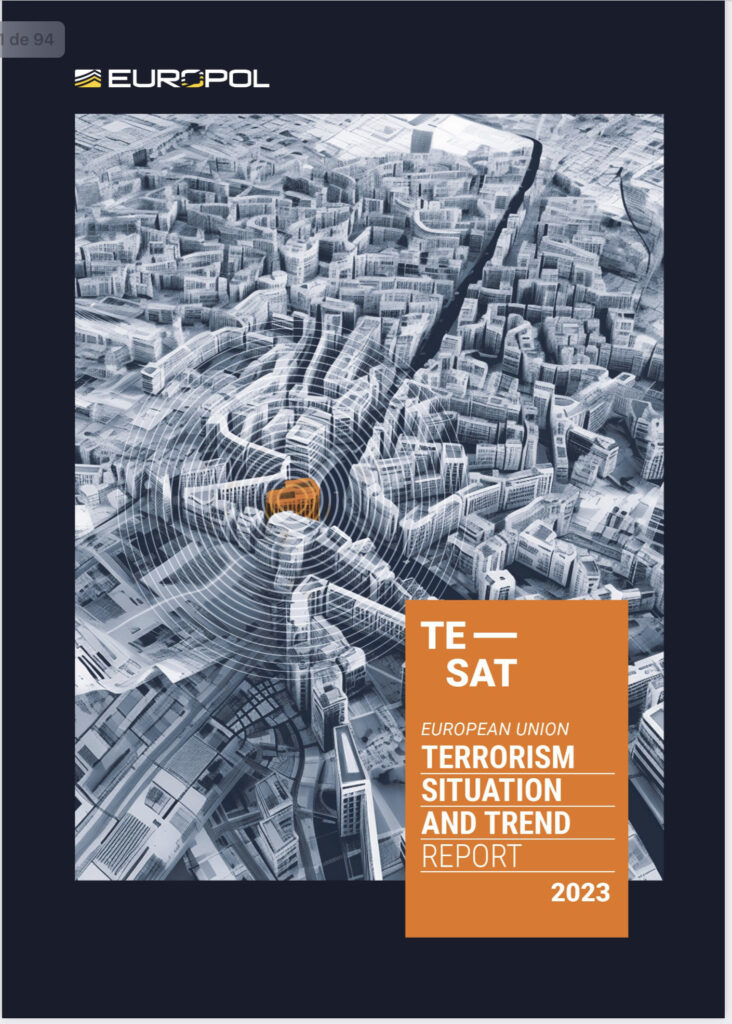
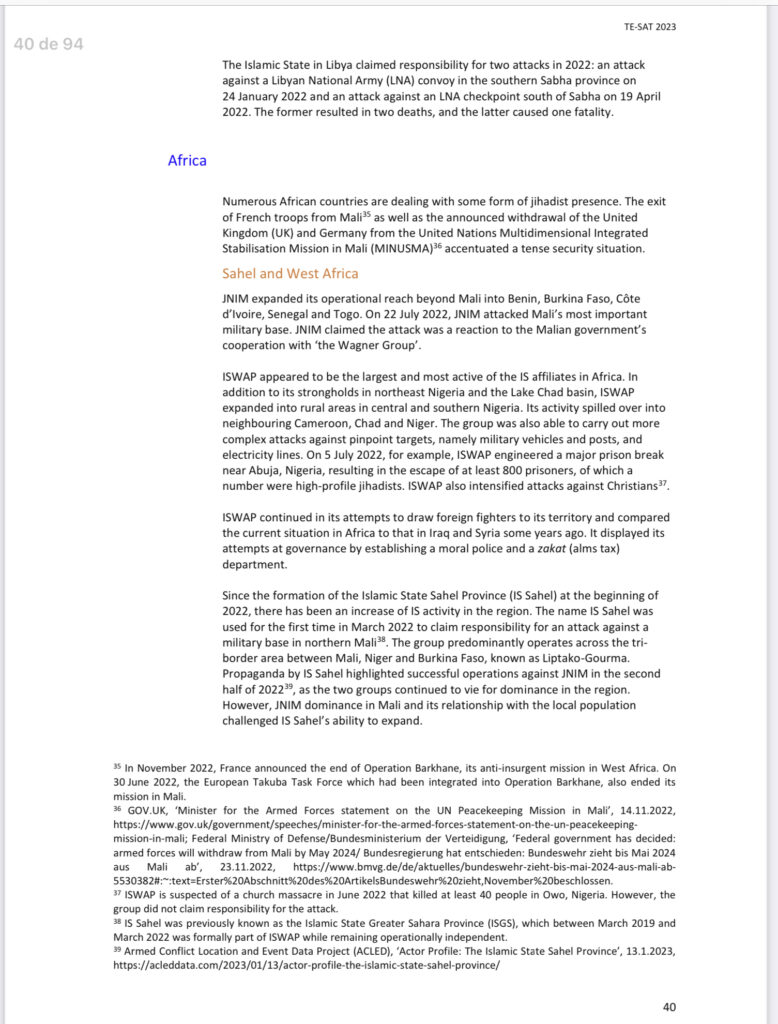
Eurojust provides valuable information on terrorism cases in Annual Reports (2022 – EN). The cases are mostly referred to investigations and prosecutions conducted by national judges and prosecutors with Eurojust support. Among other relevant tools, Eurojust may organise coordination meetings to ensure cooperation and cooperation among the authorities from different EU Member States and third States concerned by the same terrorism threat, and/or assist in the setting up, conduct and financing of Joint Investigation Teams (JITs). As examples:
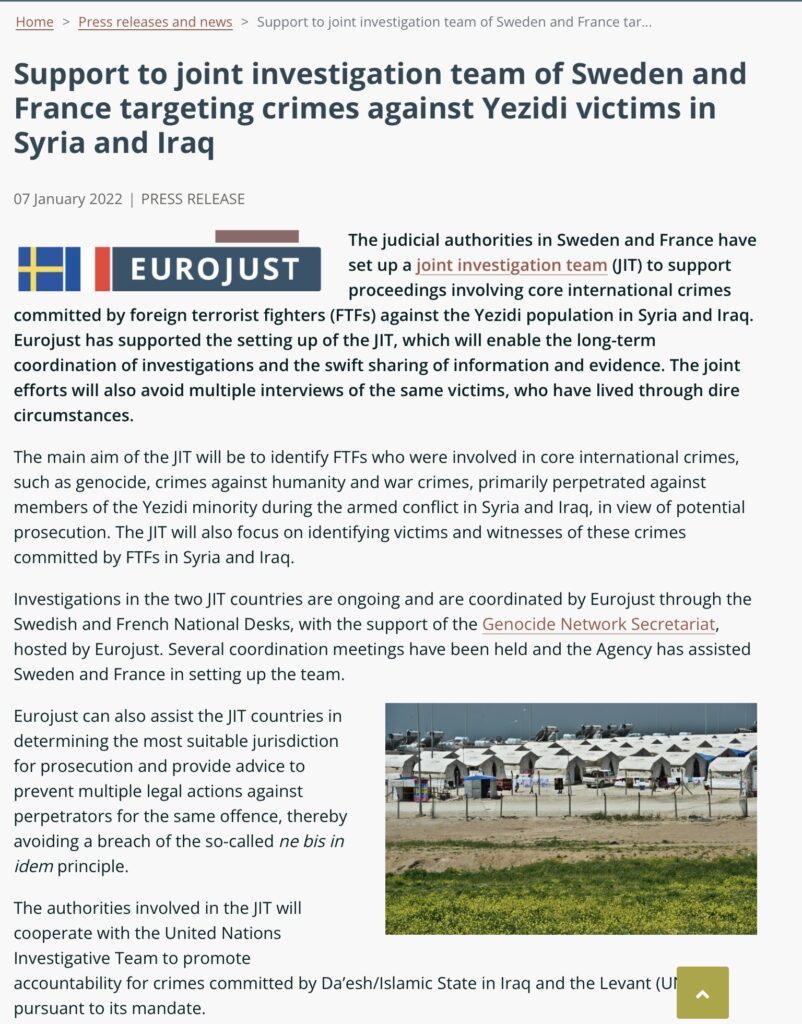

Furthermore, in 2019 Eurojust set up a Judicial Counter-Terrorism Register that collects information on judicial proceedings against suspects of terrorist offences and networks with potential cross-border implications. This EU Agency also participates in the definition of Justice criminal responses to foreign terrorist fighters (FTFs) and returnees from conflict zones. In close cooperation with its National Correspondents for terrorism matters and the Genocide Network, Eurojust may support the collection of battlefield evidence, i.e., the information collected by the military from armed conflict zones, so that such information may be used as evidence in criminal proceedings of EU Member States and third countries. With this relevant task, Eurojust support the role of UN and EU missions and operations, provides a crucial element for judicial authorities in trials and reinforces the testimonies of victims. As example, the Memorandum of Understanding signed between Eurojust and both the US Departments of Justice and of Defence on battlefield information collected by military personnel in Syria and Iraq is below. More information on Eurojust competences against terrorism offences is well described in below factsheet.
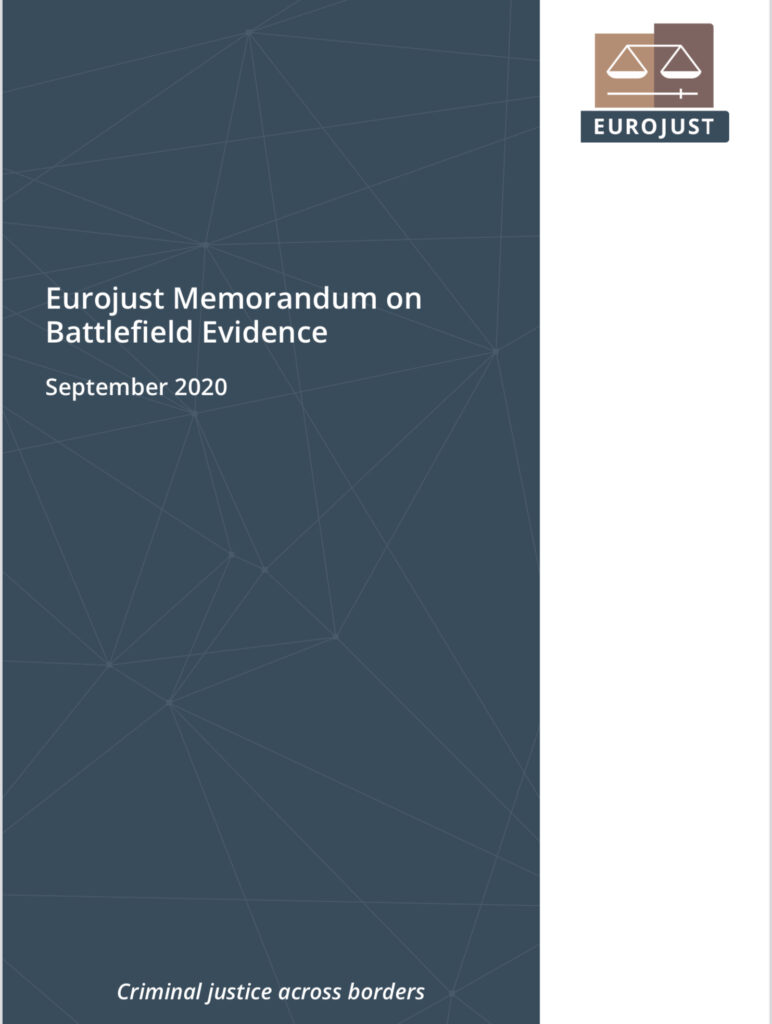
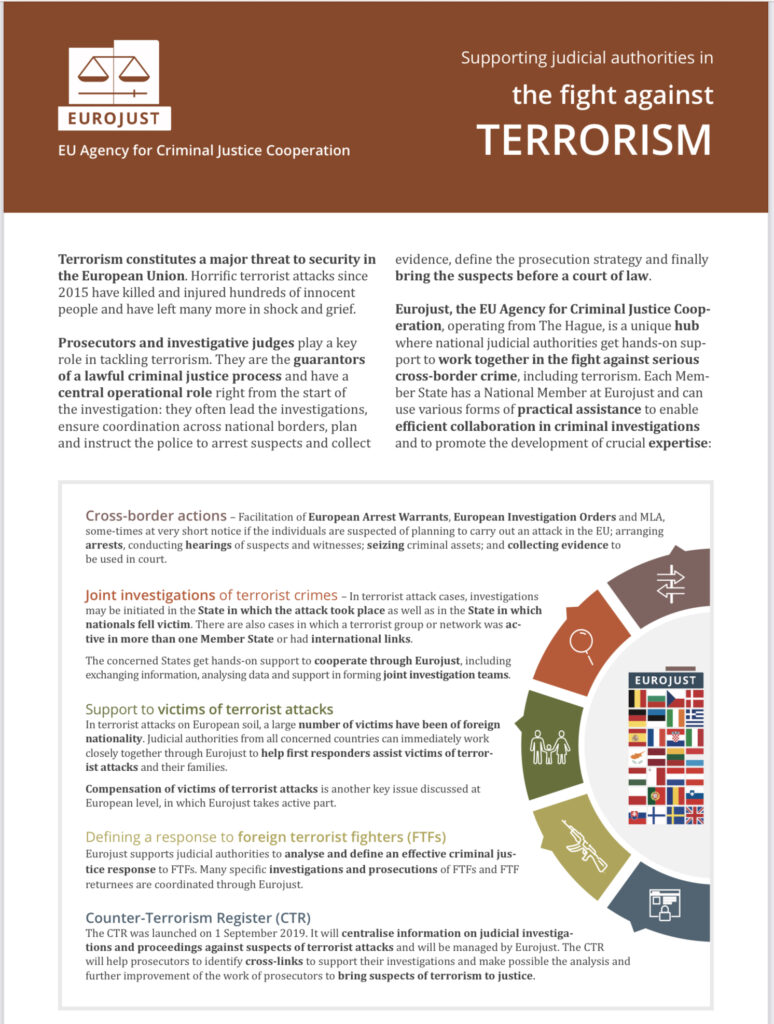
Lastly, I provide below two of my publications (2017) focused on the external dimension of EU Area of Freedom, Security and Justice, with special attention to the fight against Jihadist terrorism and Da´esh.
